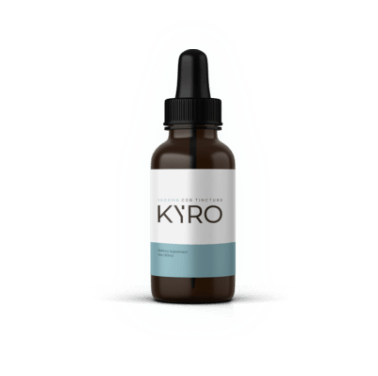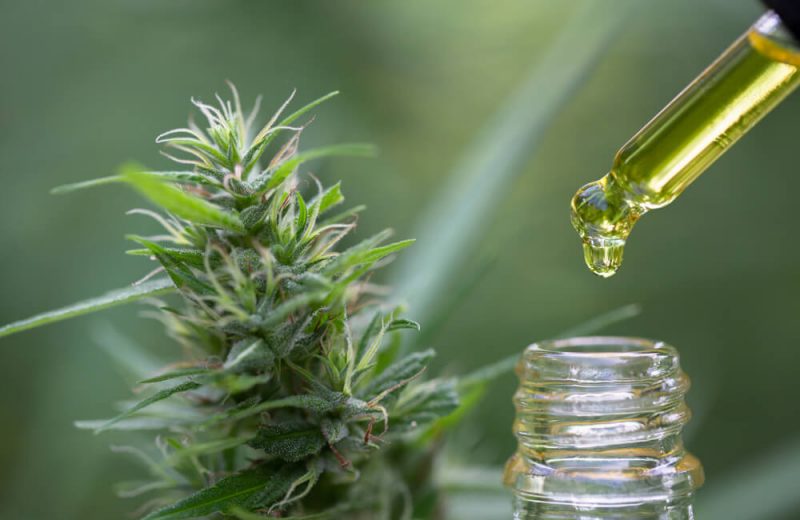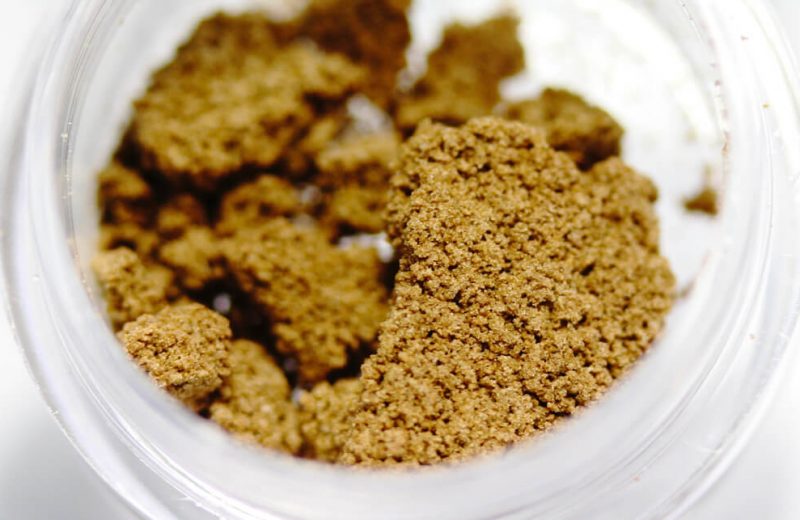
As a pet owner, you are always looking for ways to keep your four-legged friends healthy, fit and super happy. So, you might be exploring CBD oil as a supplement or treatment option for your cat or dog.
That’s not surprising, because more and more people are turning to CBD oil as a natural treatment for their health problems. And it’s true that some early research studies have consistently shown that CBD may have an impact on anxiety, chronic pain, depression, insomnia, inflammation, and other health ills.
While extensive research has not been done on the efficacy and safety of CBD oil for pets, your furry friends may also stand to gain from these therapeutic benefits of cannabidiol oil.
So, should you give your dog or cat CBD oil? What are the benefits of CBD oil for pets? And what kind of pet conditions may CBD oil treat?
This explainer article takes a 360-degree look at what you need to know about CBD oil for pets, including whether it’s safe for your dog or cat. So, let’s get right to it.
What is CBD Oil?
CBD oil – or cannabidiol oil as it is technically known – is an extract that’s usually derived from the hemp plant or other cannabis strains. Its primary ingredient is CBD in varying concentrations, but the oil may also contain terpenes, carrier oils, other natural cannabinoids, and other manufacturer-specific additives.
Cannabidiol (CBD) is one of 100+ active chemical compounds called cannabinoids found in the hemp plant (Cannabis sativa), which is closely related to the more potent marijuana plant (Cannabis indica).
Many people may be familiar with another popular cannabinoid, THC (Tetrahydrocannabinol), which is known to have psychoactive effects on the brain. It’s what gives you the feeling of “high” when you consume marijuana.
Unlike its intoxicating counterpart THC, CBD has no psychoactive effects, which means it won’t get your dog or cat high. In fact, CBD may help counter the psychoactive effects of THC.
So far, there are few extensive and long-term research studies that assess the safety and effects of CBD oil for pets. However, CBD action on cannabinoid receptors via the endocannabinoid system (ECS) is thought to help create a calming effect on pets. Because CBD has no intoxicating effects, it is generally considered to be safe for your four-legged friends.
For these reasons, holistic vets are recommending CBD oil to treat a broad range of canine conditions that include chronic pain, anxiety, inflammation, and depression.
It’s worth noting that, to the extent, they are used at all, most CBD oil products are aimed at increasing a sense of comfort, alleviating distress, and enhancing the quality of life in dogs and cats. But it’s best that you consult with your pet’s veterinarian first.
Best Ways to Administer CBD to Your Dog or Cat

CBD for pets is available in many forms, most notably oil, tinctures, tablets, pills, chewable, topical, spray, and treats, among others.
Because most vendors sell potent CBD oils that’ll deliver faster therapeutic effects, it may not be possible to blend it into cheese and have your cat or dog chow it down. Even so, these six ways make it easier and less hassle to administer CBD to your cat or dog:
(1) Sublingual Administration
When administered sublingually, CBD will more quickly deliver its therapeutic effects for your dog or cat. This quick-acting method allows CBD to enter the pet’s bloodstream directly as it is applied under the dog’s or cat’s tongue.
Sublingual consumption works best with CBD oils and CBD tinctures that tend to have higher concentrations of cannabidiol, allowing for precise dosing for your cat or dog. In other words, the use of CBD oil enables the pet owner to consistently get the dose right.
In light of this, the sublingual application is best for treating acute conditions that require instant relief such as an anxious dog during thunderstorms.
According to a recent study by the AAHA, there’s anecdotal evidence that CBD oil tinctures offer the highest bioavailability and the best absorption rates to the dog’s bloodstream when it’s administered sublingually.
If your dog or cat is not agreeable to this method of consumption, there are other ways you can get CBD into their bloodstream.
(2) Administer Directly Insider the Pet’s Mouth (Oral Administration)
This is perhaps the easiest method for administering CBD to a dog or cat. Simply apply CBD oil or tincture directly inside the pet’s mouth. Most dogs and cats are readily agreeable to this technique.
Most CBD oil products often come in 30ml bottles, complete with a 1.5ml dropper. To determine the number of drops you need, consider the concentration of the oil (usually 350mg), intended purpose, and the weight of your pet.
Once you know the right dosage, draw up the exact amount into the dropper and place the tip inside your dog’s or cat’s mouth before squeezing out its content. Make sure you insert the dropper as far back of the pet’s mouth as possible, ensuring that you don’t gag the animal.
You can cap things off by providing your four-legged friend with their favorite treat or drink soon after oral administration. This way, you can be sure that your dog or cat will swallow the entire dose and not spit anything out.
Also, this makes the dog associate the CBD oil bottle with getting treats, which could help to ease dosing your pet.
(3) Mix CBD into Pet’s Food

Some dogs and cats won’t allow you to apply CBD oil sublingually or otherwise orally, which leaves you with fewer options. Perhaps the most effective alternative is to blend CBD into their favorite food.
This method of administration works amazingly well with wet foods, but you might have to begin with small doses and then increase it gradually. This way, your cat or dog will have ample time to get accustomed to the taste and effects of CBD.
It is not complicated. Apply a few drops of CBD oil/tincture to the pet’s food, blend it in, and let it sit for a couple of minutes so that the food flavors marry well with the rich taste of cannabidiol. From here, you can feed your cat or dog normally.
The trick is to make sure that your pet’s feeding routine stays the same. Some dog owners find it easier to mix CBD into a small amount of bone broth. Your dog won’t notice any difference thanks to the hearty taste of the broth.
Other dog owners make a peanut butter ball and place CBD somewhere in the middle. CBD tablets may be ready-made for this method of application. Depending on what your cat or dog tolerates the most, crumble the CBD pill or tablet onto rich-tasting, quality food.
(4) Add to the Pet’s Drinking Water

While this method might not deliver the best CBD bioavailability, it’s still one of the most pet-friendly ways to administer cannabidiol to your dog or cat. The challenge is that your pet might not drink the entire bowl of water in one go.
If you prefer this method, be sure to choose a time when your dog or cat is thirsty, which is usually after a walk or in the morning. Because getting the dosage right is difficult, this method is not recommended for serious pet conditions like terminal-stage cancer.
(5) Put CBD Oil on Pet Treats
If getting your cat or dog to consume CBD using the above-mentioned methods doesn’t work, this is sure to get the right results. Ideally, this should work with absorbent or porous pet treats, a property that will help soak up enough CBD oil.
The best way to do this is to pour an exact dose of CBD oil on top of the treat and let it soak for a few minutes before giving it to your dog or cat the usual way. Don’t forget that the higher the dose, the more treats you will need.
Mixing the oil into treats is a great way of administering CBD to pups, kittens, and small-size dog breeds that require a lower dose. As you might already suspect, adding a whole 1.5ml dropper of CBD oil will get the treat so soggy and unsightly that your pet might not eat it.
(6) Transdermal Application
While certain studies have shown that CBD oil tinctures have the highest absorption rates into the dog’s bloodstream, a transdermal application may be more appropriate for certain conditions like canine arthritis, fur problems, and skin issues. This delivery method works best with CBD topicals.
Available CBD topicals for pets include sprays, salves, balms, and creams that can be applied directly to the body of the cat or dog. You can rub it into the pet’s paws, fur or directly on the skin.
For all types of canine CBD topicals, check to make sure the product does not pose any health threat to your dog or cat when they eat it. If it isn’t safe or advisable for your pet to eat it by mouth, try to apply it transdermally to regions that your dog or cat won’t reach with their tongues.
Finding the Right CBD Dose for your Dog or Cat
There are several factors that each pet owner should keep in mind when deciding how much CBD to give to their dogs or cats. Here are the top considerations:
Method of Consumption

While most dog and cat parents buy CBD oil, some prefer CBD treats, capsules, and treats. As mentioned earlier, CBD oil and tinctures are fast-acting, which means your pet can feel the positive effects of cannabidiol in a matter of minutes.
It’s important to note that CBD treats, capsules and tablets will have to pass through your dog’s gastrointestinal tract first, so they take a bit longer for the pet to feel the effects.
In some cases, it may take CBD treats between 45 minutes and 1 hour to be absorbed depending on the metabolism of your dog or cat. As such, you will need to time the dosage as needed. For instance, if your dog suffers from car-induced anxiety, you might want to get a 45-minute head start before you go on a car ride.
Your Pet’s Size and Body Weight
Naturally, a larger or heavier pet will need a higher dose than a smaller one. While there are no official CBD dosing guidelines, the rule of thumb is to give your dog or cat 0.2 mg of CBD per 1lb of their body weight.
With this in mind, dogs and cats that weigh less than 20 pounds should be given between 1mg and 5mg of CBD depending on the severity of their conditions. If you are using a dropper, you will need roughly 4-8 drops.
For dogs weighing between 20 and 50 pounds, the recommended dosage is 5-10mg of CBD daily, which translates to between 12 and 25 drops from a dropper.
For larger dog breeds weighing higher than 50 pounds, a dosage of over 15mg CBD is recommended. If you’re using a dropper, more than 20 drops should be sufficient.
The Concentration of the Product
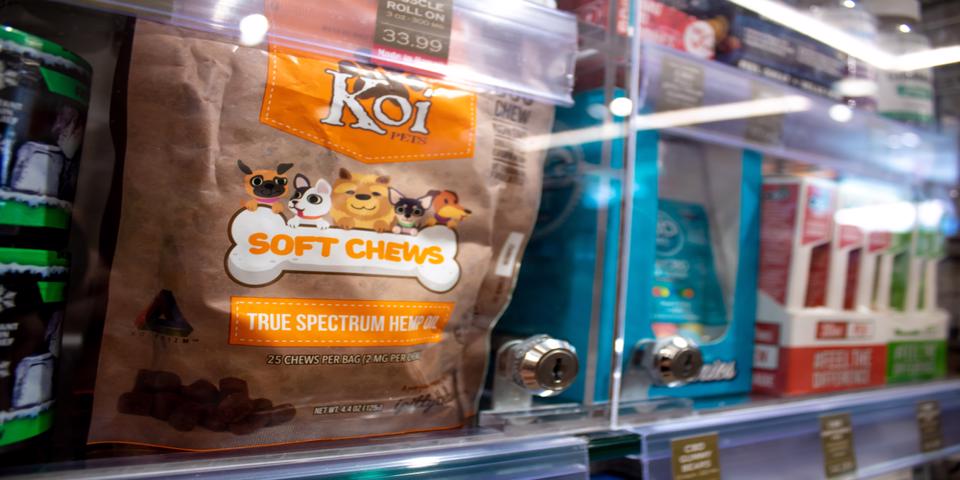
Also called strength, concentration entails the total amount of CBD in a specific product. It’s presented in mg (milligrams).
When calculating the proper dosage for your pet, you will have to consider both the concentration of CBD and the size of the bottle.
For example, if you buy a 30-ml bottle with a concentration of 1,000mg of CBD then each serving of 1.5ml standard dropper will contain 50mg of CBD. If your dog’s condition requires 100mg, then you’ll need two full droppers.
Desired Effects
For most dogs and cats, the optimal dose depends on the severity of the condition, which often comes down to the level of discomfort, anxiety or pain they’re experiencing.
A dog with severe anxiety or chronic pain, for instance, might require a higher dose to get better, whereas a pup with milder symptoms may only need a lower dose because that’ll get the desired effects.
How Does CBD Interact With Your Pet’s Body?
Even though scientists are still investigating the specific impacts of CBD on the body of a dog or cat, here’s what is already known:
Just like humans, your dog, cat, and the vast majority of other pets have an elaborate Endocannabinoid System (ECS).
The ECS is a network of neurons, receptors, enzymes, endocannabinoids, and cellular activators especially found in the brain but that also run throughout the entire body.
The primary purpose of the ECS is to regulate a series of physiological and biological processes that include stress, inflammation, mood, pain, and anxiety, just to mention a few.
All cannabinoids, including CBD and THC, bind to or interact with receptors when they enter the body, producing several different physiological responses.
Unlike THC, CBD doesn’t actually bind to CB1 and CB2 receptors, which is why it doesn’t produce the euphoric or psychoactive effects linked to marijuana use.
Instead, CBD is thought to bind to and activate some receptors that comprise the dog’s and cat’s endocannabinoid system, namely serotonin, adenosine, and vanilloid. When it activates these ECS receptors, CBD helps to regulate temperature, inflammation, stress response, perception to pain, and more.
CBD has also been found to help increase the levels of dopamine in the dog’s brain, which is how it’s believed to help improve mood and reduce anxiety.
According to the American Animal Hospital Association (AAHA), CBD may help block the GPR55 signaling and in the process reduce the reproduction of cancer cells.
The bottom line is that CBD has no psychoactive properties, unlike THC. It interacts with your body and brain through the ECS. This helps to bring the body to a balanced state.
Overall, CBD’s interaction with the ECS makes it an excellent anti-inflammatory, anti-seizure, antiemetic (it prevents nausea and vomiting), antipsychotic, painkiller, anxiolytic, and much more. All of these positive attributes depend on the concentration and bioavailability of the CBD product.
Is CBD Oil Safe for Dogs or Cats?

Research into the safety of CBD in cats and dogs is still in its infancy. However, anecdotal evidence shows that CBD use may be generally safe for cats and dogs.
In one 2018 phase 1 study involving 30 healthy beagles, Dr. Stephanie McGrath and her colleagues at the Colorado State University found higher doses of CBD to have mild side effects, such as diarrhea and increased levels of liver enzymes.
With increasing research, the understanding of the long-term side effects of CBD in pets will become more vivid. Don’t forget that not all pets are created equal – some will react more adversely to higher CBD doses than others.
With that in mind, it makes sense to begin the dosage at the lowest recommended dosing. More importantly, CBD oils and other CBD products for pets should only be given to adult cats and dogs. If you feel you must give CBD to a puppy or kitten, it’s best to seek medical advice from a trained vet first.
From anecdotal observations and existing studies, the most common side effects of (high doses of) CBD may include diarrhea, mild drowsiness, and low energy.
In very rare cases, your dog or cat may experience worrying changes in blood pressure, excessive vomiting and nausea, dry mouth, drooling, and increased fatigue. If you see any of these symptoms in your pet, you should stop giving them CBD and visit your vet as soon as possible.
From a medical standpoint, the biggest problem is not dosing CBD appropriately for your dog or cat. You should give your pet the right dose of CBD oil for the desired effects, making sure that you aren’t accidentally overdosing your pet friend.
Furthermore, it’s worth mentioning that whereas CBD is generally safe for dogs and cats, THC or cannabis isn’t. It is not only toxic to cats and dogs but can also cause psychotropic effects because they have more CB1 receptors than humans do.
According to Pet Poison Helpline, common symptoms of THC toxicity in dogs and cats include heavy vomiting, difficulty walking, glassed eyes, dilated pupils, lethargy, sedation, and frightened expression.
In serious cases of marijuana poisoning, your cat or dog may fall into a coma, experience seizures, tremors, excessive gas/bloating, agitation, increased anxiety, crying, deep changes in heart rate/pulse, and difficulty controlling temperatures.
These symptoms of THC toxicity may appear anytime between 5min and 12 hours after the animal is exposed to marijuana, and can last between 30mins and several days.
In this regard, pet owners should ensure that their CBD products are sourced from industrial hemp that contains less than 0.3 percent THC content.
Marijuana-sourced CBD, on the other hand, may contain between 5 percent and 20 percent THC. These levels of THC not only pose a great health risk to your pet but may also not be legal, depending on which state you reside in.
As a general rule of thumb, dogs and cats shouldn’t consume CBD products made especially for human consumption. Additives like sweeteners found in human CBD oil may be toxic to your four-legged friend. The opposite may also be true. Human should not consume CBE products designed for animals.
Bottom-line: Pure CBD products (ones that contain no THC or additives) seem to be well-tolerated and safe to dogs, cats, and other animals, as noted in this 2017 report by the WHO. It also appears that the liver is the primary organ that metabolizes CBD, so it may not be safe for a pet that has liver disease or other liver complications.
Health Benefits of Giving CBD Oil to Your Pets
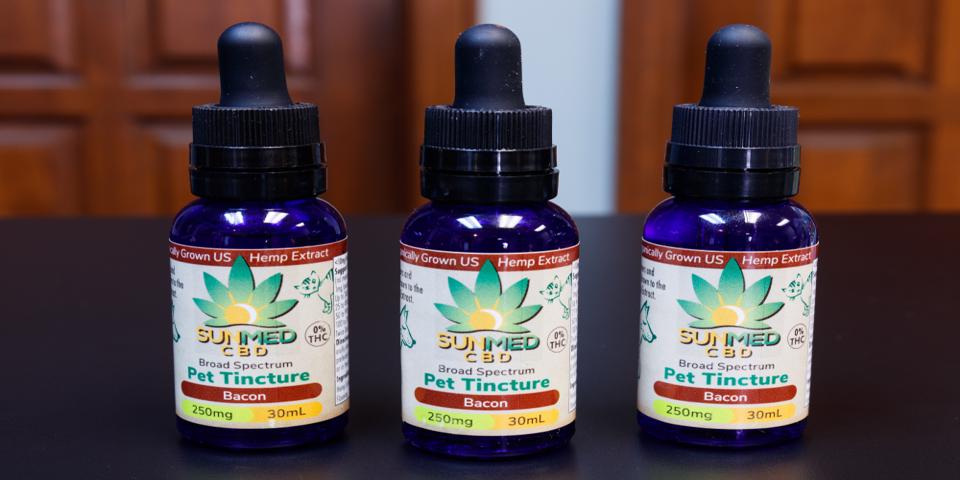
As previously mentioned, only a few peer-reviewed and extensive research studies have been done to ascertain the effects of CBD on pets. They are preliminary at best and quite small, so making comprehensive claims from them is ill-advised.
Nevertheless, giving CBD oil to your dog or cat is thought to have numerous health benefits that include:
Reducing Symptoms of Canine Arthritis
Given its positive interaction with cannabinoid receptors and the ECS, CBD has been linked to anti-inflammatory and analgesic properties. This can come in particularly handy for cats and dogs suffering from osteoarthritis (OA).
When your dog takes CBD, it activates cannabinoid receptors in the inflamed joints, reducing both inflammation and chronic pain associated with arthritis.
CBD also binds to and activates receptors that are known to help boost the levels of dopamine, serotonin, and other neurotransmitters that influence pain perception and mood. In this way, CBD helps alleviate pain and improve mood, especially for arthritic dogs. And there are several studies that seem to concur.
In a 2018 small clinical study published in the journal Frontiers in Veterinary Science, researchers found that giving dogs with osteoarthritis a dose of around 1mg/lb. (2mg/kg) twice daily may be linked with increased activity, improved movement, and elevated comfort.
In another crossover clinical trial carried out from 2016 through 2018, Dr. Stephanie McGrath and S. David Moche noted “promising results” in reducing pain and inflammation in dogs with OA.
More exciting, the duo found that none of the dogs with OA treated with CBD experienced adverse side effects, including diarrhea or vomiting.
Reduces Seizures in Epileptic Pets
Both cats and dogs can be afflicted by epilepsy; however, it is not as common in cats. Parents of epileptic pets know too well that seizures can be incredibly uncomfortable and distressing for their four-legged friends.
While several prescription drugs meant to curb seizures in canine exist, unfortunately, they can adversely affect their energy levels, lethargy, weight gain, and cause mood problems. Worst case scenario, these medications can lead to heart, liver or kidney failure.
Lucky for pet owners, increasing research seems to suggest that CBD may help in reducing the duration, frequency, and amount of seizures for felines and canines with epilepsy.
In one recent study conducted involving 16 epileptic dogs, Dr. Stephanie McGrath, a neurologist at CSU treated 9 participants were treated with 5 mg/kg CBD daily for a period of 12 weeks. The remaining 6 dogs with epilepsy were put on placebo treatment.
From McGrath’s observation, 89 percent of the epileptic dogs that consumed CBD saw a significant decrease in the number and frequency of seizures per day.
It might be prudent to note that while this clinical trial is a peer-reviewed study, it’s still preliminary and very small. All the same, this shows that CBD use in dogs may have a positive effect on canine epileptic seizures.
If more extensive and well-designed research shows that CBD works in treating seizures, it can be a groundbreaking discovery in improving the quality of life for epileptic dogs. The best news is that CBD doesn’t carry many adverse side effects and may be more effective than most of the drugs available today.
Impact on Anxiety in Pets

Depression and anxiety are common psychological complications that can have negative impacts on your pet’s health and well-being. This is particularly true for dogs that get too scared or anxious during car-rides, thunderstorms, and more.
Anxiety in dogs, cats, and other pets is typically treated with vet-prescribed drugs, which can lead to a series of debilitating side effects including restlessness, agitation, drowsiness, and reduced energy levels.
Preliminary research carried out on CBD for humans has shown that it may be effective in treating anxiety.
In one 2016 study, scientists note that CBD oil may be used to safely treat anxiety in kids with PTSD. This is corroborated by another 2019 Brazilian study involving 57 male participants, showing that CBD oil may help significantly reduce anxiety.
These properties may be linked to CBD’s ability to bind to and act on neurotransmitters, receptors for serotonin, and other activators that control mood and anxiety.
Because CBD may act through the ECS in similar fashion in dogs and cats as it seems to in humans, these anxiolytic properties may be applicable to pets, too.
Otherwise put, CBD may act on cannabinoid receptors in the dog’s or cat’s ECS to induce calming effects that can do wonders for anxiety. CBD oil has also be linked to increased levels of dopamine in the dog’s brain, which can help not only regulate mood but also keep anxiety at bay.
CBD May Alleviate Symptoms Associated with Pet Cancers
Canine and feline cancers have become quite rampant, causing immense distress to pet owners.
From early research and anecdotal evidence, some scientists and holistic veterinary specialists believe that CBD oil may help reduce adverse side effects associated with cancer treatment, like chronic pain, vomiting, nausea, and lethargy. It may also help curb symptoms linked to cancer.
Accordingly, there are a few peer-reviewed animal studies that have suggested that CBD may be linked to anti-cancer properties.
These qualities could be attributed to CBD’s ability to block GPR55 signaling, which may help decrease the reproduction of cancer cells.
For instance, one such 2011 study noted that higher doses of CBD could help kill off or trigger the death of breast cancer cells.
In another mice study published in the journal Molecular Cancer Therapeutics, scientists found that CBD may help inhibit the spread of invasive breast cancer cells.
While the vast majority of research on the subject is in the form of animal and test-tube studies, they suggest that CBD may also work in dogs and cats. However, more conclusive studies in pets are needed before conclusions can be drawn.
Bottom line: Even though CBD has been linked to cancer-fighting properties that may help reduce symptoms related to pet cancer and cancer treatment, more studies are required to ascertain its safety and efficacy.
Appetite Stimulation in Cats and Dogs

As stated earlier, dogs and cats, like humans, have a specialized system that is known as the endocannabinoid system (ECS) which helps regulate a broad range of physiological functions, including appetite.
As such, CBD has properties that work through the ECS to possibly induce a healthy appetite, produce calming effects, and improve mood in dogs and cats.
Is your dog or cat not eating? There are many reasons that might explain why your pet may experience loss of appetite, including cancer, tumor, pain, hip dysplasia, anxiety, vomiting, nausea, and diarrhea, just to mention a few.
Some cats and dogs just go through bouts where they simply don’t want to consume any food.
CBD has been linked to an improved appetite for dogs and cats that may be having a difficult time chowing down food.
By positively impacting on the ECS, CBD may also help alleviate an array of other canine and feline conditions, such as itchy, dry or irritable skin, digestive problems, muscle spasms, glaucoma, and allergies.
Side Effects of Giving CBD Oil to Your Pets
As a pet owner, you want the very best for your dog or cat. This begs the question: are there any side effects of giving CBD oil to your four-legged friend?
Increased Liver Factors: Perhaps the most noted side effect with giving CBD oil to pets is increased liver values such as enzymes. This doesn’t come as a big surprise to most vets and medical experts because the liver is responsible for breaking down drugs and toxins.
If left unchecked, prolonged elevations of liver values may lead to other health complications, but this happens rarely in dogs and cats. However, it’s best to trust your instincts and talk to your veterinarian to figure out the optimal dosage for your cat or dog to prevent liver issues.
Diarrhea and Gastrointestinal Upset: This is one of the major side effects noticed on dogs and cats using CBD. This has been seen in pets taking high doses of CBD, which may responsible for GI irritation that may eventually cause diarrhea.
If your pet friend seems to be reacting badly to CBD consumption, don’t hesitate to stop it and seek medical advice from your vet.
Dry Mouth: For reasons not yet known to scientists, CBD has shown dehydrating effects on a dog’s or cat’s mouth by decreasing saliva production. For your dog, this may manifest in the form of increased thirst and panting.
Drowsiness: Some dog and cat owners have reported that CBD may be slightly sedating for their pets. While CBD may help alleviate anxiety via the action of ECS, the same calming effects may cause slight drowsiness, particularly if your pet is using a high-dose CBD product.
Lowered Blood Pressure: Temporary drop in blood pressure and sometimes accompanied by a similar drop in pulse rate has been noticed on pets using high doses of CBD. While the decrease in blood pressure might be slight, it may cause your pet to feel a little fatigued or lightheaded.
Are There Any Risks of Giving CBD Oil to Animals?
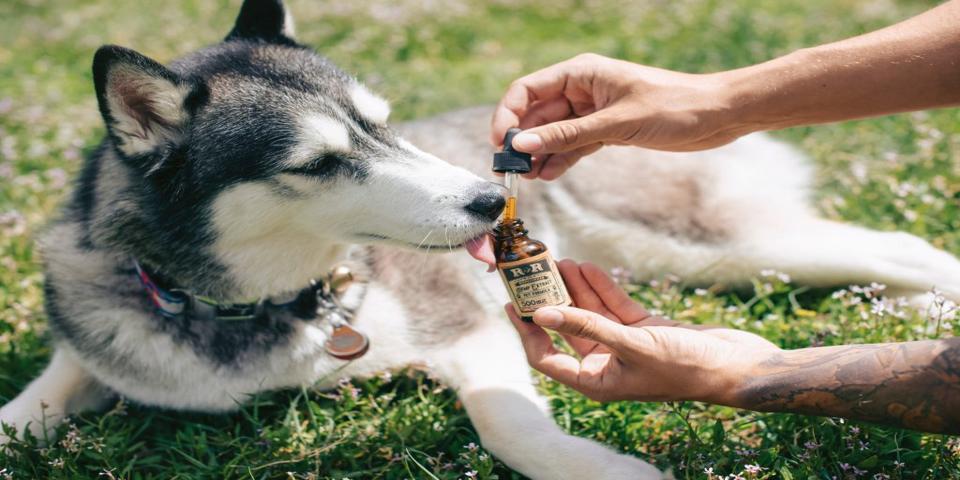
Again, the risks, safety, and efficacy of CBD for pets have not been researched extensively and conclusively. So, it is too early to tell what risks are lurking for your cat or dog.
There are no established industry regulations and quality controls. Understandably one of the biggest concerns for dog and cat owners is the issue of quality control. The CBD market, in general, is a highly unregulated industry, and CBD for pets is no different.
First of all, the FDA has not approved or cleared any CBD for pets’ products on the market today. Even worse, they haven’t released any recommended dosing guideline and chart, which means it’s up to the owner and producers.
Giving your dog or cat too much CBD can have far-reaching consequences, causing diarrhea, lowered heartbeat, lethargy, and increased liver values. Knowing what dose is safe or toxic for your pet is still a big risk for dog and cat owners.
For this reason, you are advised to start small, watch your pet’s reaction to the dosing, and increase the dosage accordingly. More importantly, don’t forget to check with your vet before and after giving CBD oil to your pet.
It may increase the risk of developing liver complications. In one way or the other, CBD has to pass through the liver where it’s metabolized. That’s why increased liver values are some of the most noticeable side effects of giving CBD oil to your dog or cat.
If the pet is dosed inappropriately, in the long term this can elevate the risk of developing liver complications.
CBD may potentially cause adverse interactions with other medications. Liver enzymes such as CYP3A4 breaks down roughly 25 percent of all drugs, including calcium channel blockers, painkillers, anti-allergens, statins, and more.
That being said, CBD may possibly impact negatively on the metabolism of other medications. This can increase the risk of toxic buildup. As such, it’s always prudent to talk with your vet before giving CBD oils to your pets if they are on other medications.
It may increase the risk of THC toxicity. Considering that the market is not well-regulated, CBD products may contain high levels of THC, which as we’ve seen earlier is toxic to dogs and cats.
One way of reducing these risks is to only buy and use CBD products with a COA (Certificate of Analysis) slip and number. This certificate is given only when the product has undergone thorough testing and screening by a third-party laboratory to clarify its potency, source, and confirm that it contains less than 0.3 percent THC.
Summary
CBD, also technically cannabidiol, is one of the many naturally occurring active compounds called cannabinoids found in the hemp plant.
Medical research on CBD for pets is still in its infancy, but a number of anecdotal evidence, clinical trials, and studies have shown that it may help treat an array of conditions affecting dogs and cats.
Just like humans, dogs, cats and a number of other pet animals have an extensive endocannabinoid system (ECS), whose role is to regulate multiple physiological functions, including sleep, temperature, appetite, pain sensation, anxiety, depression, and more.
It’s though this impact on the ECS that CBD is thought to offer a plethora of potential therapeutic benefits.
CBD has been shown to have a positive effect when dealing with symptoms associated with pet cancer and cancer treatments. For instance, it may help deal with discomfort, nausea, vomiting, and chronic pain, all of which are often linked to cancers and tumors affecting dogs and cats.
Because of its action through the ECS, CBD may help dogs and cats suffering from a loss of appetite, especially when dealing with nausea, cancers, and more.
Thanks to its interaction with cannabinoid receptors through the ECS, CBD may possess excellent anxiolytic properties.
It may also help reduce the frequency, duration, and amount of seizures experienced by epileptic dogs, cats, and other pets.
CBD has traits that help work through the endocannabinoid system to create a sense of calm and relaxation, as well as block pain sensation and reduce inflammation. This can come in handy for dogs suffering from osteoarthritis, aging joints, and other conditions.
With that in mind, there are several different ways of safely and effectively administering CBD to dogs and cats. For starters, you can apply directly to the pet’s mouth either sublingually or orally. These two delivery methods are incredibly fast-acting, with results being felt in less than 5 minutes.
Some pet owners prefer to crumble CBD products into treats, mix into their food, or apply trans-dermally.
While more research on the subject is still needed, CBD is generally safe for dogs, cats, and other pets. In fact, a 2017 WHO report showed that pure CBD seems to be well-tolerated and safe for use by many animals, including humans, dogs, and cats.
Because of quality control issues, getting the dosage right can be very problematic for most pet owners. It’s, therefore, crucial to speak with your vet before giving your dog or cat CBD.
If you aren’t careful, overdosing CBD may cause unpleasant side effects to your fury friend. Some of the most common side effects may include diarrhea, vomiting, lowered blood pressure, dry mouth, elevated liver values, and drowsiness.
The other big issue is that CBD may contain additives and THC, which is well recognized as toxic to cats, dogs, and a variety of other pets. That’s why you should only use hemp-extracted CBD oil that contains no THC (technically, it should be lower than 0.3 percent in concentration)
If you choose to give CBD to your dog or cat, be sure to consult with your veterinarian first. Moreover, begin with a small dose and carefully keep track of your dog’s negative and positive effects. From this, you can gradually increase the dose until you hit the sweet spot.

